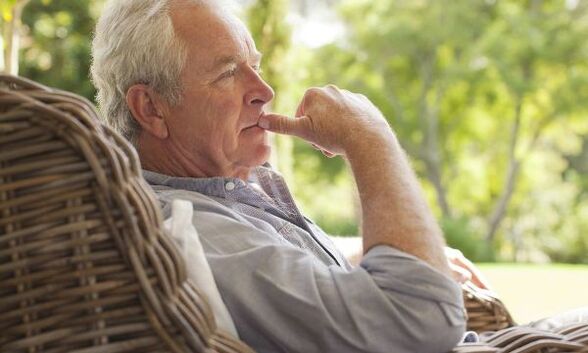With prostatitis, an inflammatory process occurs in the region of the prostate gland. This is one of the common urinary tract diseases. The causes of prostatitis in men are varied.

What is prostatic disease?
This disease is accompanied by a violation of urination. Quite often, a man has a feeling that his bladder is not completely empty.
The main cause of acute bacterial prostatitis is an infection:
- transmission during close contact (ureaplasmosis, chlamydia);
- penetration into the urethra from the area of the rectum (Klebsiella infection, Pseudomonas aeruginosa).
If the prostate is inflamed, a man's emotional state can quickly deteriorate. In this case, the libido gradually decreases.
Nervous system impairment may be characterized by the following symptoms:
- worry;
- deterioration in mood;
- sleep disorders;
- increased irritability.
Where does prostatitis come from?
It is worth explaining what causes acute or chronic prostatitis in men. The likelihood of developing the disease increases under the influence of the following main factors:
- promiscuous sex;
- failure to observe the basic rules of personal hygiene;
- reflux of urine into the bladder area;
- phimosis;
- Hypothermia;
- strong mental shock;
- stagnation of blood in the pelvic region.
Cause of disease
Acquired causes of prostatitis include:
- urethral stricture. It leads to impaired urine flow and increased pressure in the urethra;
- trauma to the perineum, which causes the appearance of a chronic inflammatory process;
- stones in the prostate gland;
- arduous physical work;
- the presence of a chronic inflammatory process in which the vessels of the prostate gland are affected.
Acute and chronic infectious diseases
The inflammatory process in the prostate gland can be the result of another disease. These diseases include: gonorrhea and urethritis. The following diseases can also cause the development of the disease:
- cystitis;
- angina;
- incompletely treated caries;
- tuberculosis.
In the case of concentrated acute or chronic infections, you must first eliminate the root cause of the disease: neutralize the activity of the infectious agent.
jam
Congestive (congestive) prostatitis is often accompanied by damage to testicular tissue. With this pathology, a violation of spermatogenesis occurs, the synthesis of sex hormones is slowed down. With congestive prostatitis, erectile dysfunction often occurs.
The risk of chronic congestive prostatitis increases under the influence of the following factors:
- little physical activity;
- weakness of the muscles in the pelvic floor;
- abstinence from prolonged closeness;
- interrupted sex, as a method of protection from unwanted pregnancy;
- frequent constipation;
- the presence of cancer;
- decreased vascular tone;
- the occurrence of complications after surgical interventions on the pelvic organs;
- pelvic venous insufficiency.
Treatment of congestive prostatitis involves the use of nonsteroidal anti-inflammatory drugs. These drugs eliminate discomfort, reduce tissue swelling.
If indicated, antiplatelet agents are used. These drugs improve blood thinning.
With congestive prostatitis, the introduction of sulfated mucopolysaccharide in the form of an injection, using nicotinic acid is indicated.
Intravenous tonics help increase the strength of the venous walls. Drugs from the group of alpha blockers help improve urine flow. In some situations, when the prostate is blocked, immunomodulators, muscle relaxants, and sedatives are used.
Sedentary work
An inactive lifestyle causes the appearance of stagnant processes in the tissues of the prostate gland. Due to passive pastime, the functions of the nervous and endocrine systems are impaired. The risk of developing prostatitis increases in unfavorable environmental conditions.
Long abstinence
With prolonged abstinence, stagnation of semen is observed. Pathogenic microorganisms can begin to multiply in it, which leads to the appearance of an inflammatory process in the prostate gland.
If abstinence is prolonged, sexual desire diminishes. Lack of sexual activity can also cause impotence.
Hypothermia
Under the influence of low temperature, the corresponding circuits narrow. In this case, the blood supply to the prostate gland is disrupted, leading to impaired nutrition of this organ.
To avoid hypothermia, you need to follow simple recommendations:
- encourage the wearing of outerwear that is appropriate for the season;
- Avoid staying in windy places for a long time, near air conditioners.

Causes of prostatitis in men after the age of 40
Prostatitis in young men develops under the influence of such causes as:
- obstruction in the pelvic region;
- the presence of hidden infectious diseases (chlamydia, trichomoniasis). With such pathologies, a slow inflammatory process occurs in the tissues of the prostate gland.
Causes of prostatitis in patients over 55 years old
The disease after 55 years of age can occur under the influence of the following factors:
- androgen deficiency;
- the presence of muscle atrophy of the pelvic floor;
- weakened immunity due to chronic infections;
- slow down blood flow;
- extinction of sexual function;
- weakness of the sphincter located in the bladder region.
One of the causes leading to the development of prostatitis is being overweight. Due to the extra weight, increased pressure is created on the area of the iliac vein plexus.
Other causes of the development of the disease
According to psychologist (Louise Hay), a man's health depends on the psychological state of men. According to this theory, the causes of prostatitis can be as follows:
- a feeling of not being able to control the main events of your life;
- inner experience due to sexual failure;
- guilt towards a partner.
The pathology is often diagnosed in elderly men who feel insecure in their abilities.
To prevent the development of prostatitis at this stage of life, you need to learn to think positively. A man should not focus on what makes him depressed.
Why does prostatitis in men cause pain?
It is worth explaining where it hurts when the prostatitis is advanced. As the disease progresses, pain appears in the following parts of the body:
- scrotum;
- penis
- lower than before;
- area of the anus.
Pain during prostatitis in men depends on the following factors:
- stages of the disease;
- localization of inflammatory foci.
With a prolonged episode of prostatitis, pain may occur in the area of the seminal vesicles and seminal vesicles.
Pain in the legs
It is worth knowing what are the main symptoms of prostatitis, what pain. When the prostate is inflamed, blood circulation is disrupted. This can cause pain in the lower extremities.
In some cases, bacterial prostatitis develops into reactive arthritis. In this case, the pain does not occur in the muscle but in the area of bone or joint tissue.
Discomfort in testicles
One of the signs of the disease is pain in the perineum. It can spread to the penis, pubic area, and testicles. Discomfort in the testicles and inguinal folds occurs when the seminal vesicles are affected.
An unpleasant sensation of a shooting letter in the testicles and prostate is observed in the presence of pyogenic processes. In this case, the course of the disease is complicated by a violation of the process of urination, severe weakness, fever.
Discomfort in the anus
The main cause of anal pain is the prostate gland located next to the rectum. At the same time, discomfort has a shooting nature. The discomfort is aggravated during defecation.
The pain that occurs with an infection of the prostate gland can be accompanied by constipation and bloating.
Tailbone pain
Pain in the coccyx is one of the symptoms of the disease. Discomfort is often accompanied by a sensation of a foreign body in the anus. Similar symptoms indicate a violation of the body's functions in chronic prostatitis.
Lower abdominal pain
With the progression of the disease, the volume of glandular tissue of the organ increases. The lower abdomen is often painful. In this case, the inflammatory process covered the bladder and rectum.
After the treatment, the swelling disappeared. The prostate gland is reduced in size. As a result, the pain in the lower abdomen becomes less pronounced.
Pain localization
If you feel pain, you need a comprehensive medical examination. A similar site of pain is observed in diseases of the rectum, prostate cancer.
Remedies for pain relief
To eliminate discomfort, analgesics and antipyretics from the pyrazolone group are used. The tool helps to relieve pain, has an anti-inflammatory effect.
Diphenhydramine hydrochloride has anesthetic properties. This device helps to relax smooth muscles. The drug has a calming effect on the nervous system. NSAIDs from the sulfonanilide group are endowed with pronounced anti-inflammatory and analgesic properties.
Effective folk remedies also help relieve pain:
- An infusion made from burdock.It is necessary to pour 10 grams of pre-ground roots with 200 ml of water. The product is cooked over low heat for 10 minutes. Then, let the broth simmer for 30 minutes. Drink 100 ml twice a day. The decoction is taken 30 minutes before a meal. The average duration of the course is set individually.
- Pumpkin seeds.Eat 1 tablespoon of vegetable seeds twice a day. Pumpkin seeds should be eaten 60 minutes before meals. The average duration of the course varies from two to three months. Pumpkin seeds are distinguished by pronounced antiseptic properties.
Before using pain relievers, you should consult a urologist. Appropriate agents can cause side effects.
Prostatitis, a rather complex psychological disease, is preventable. This requires: moderate physical activity, eating right, giving up bad habits, having sex regularly.




































